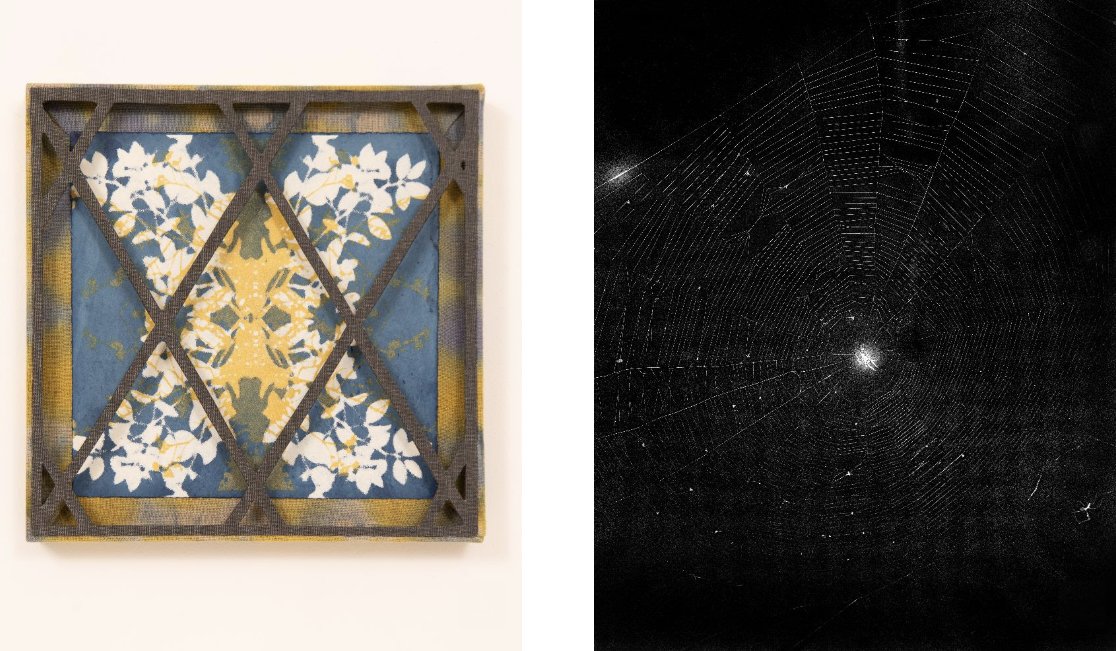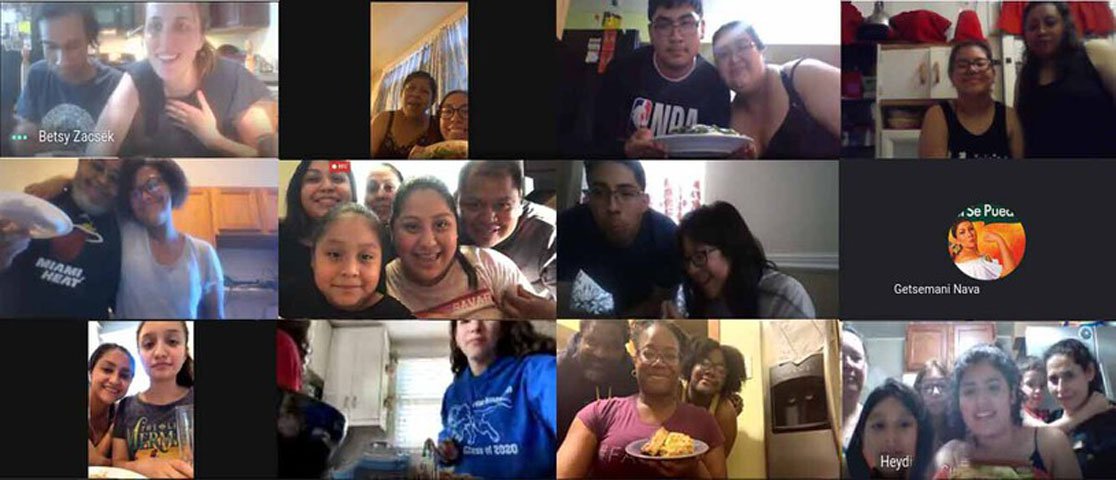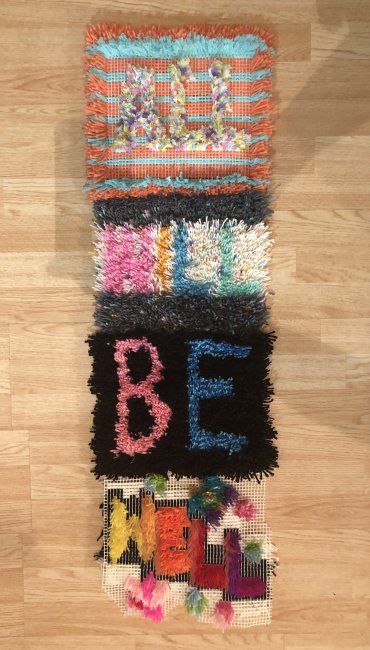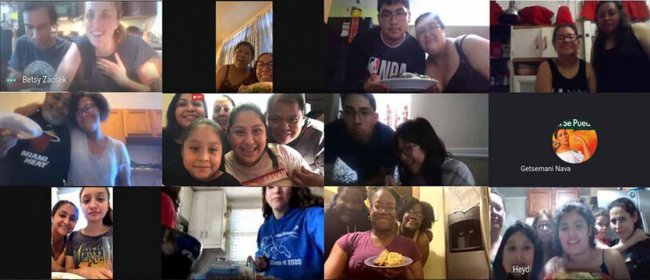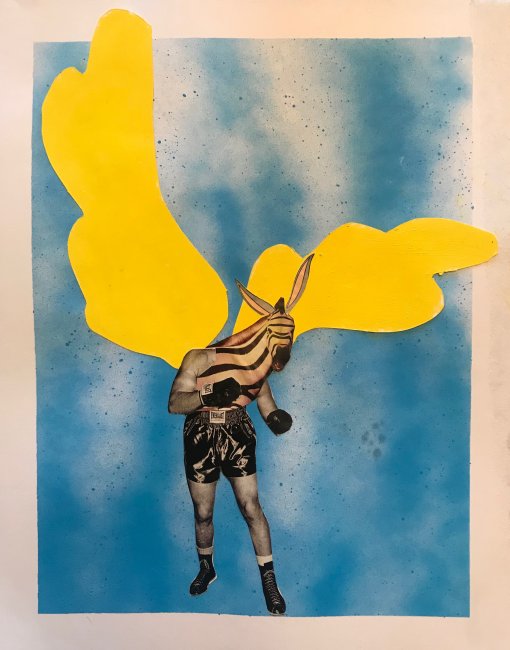ACRE + CAPE Launch Remote Learning Partnership
This summer ACRE (Artists’ Cooperative Residency and Exhibitions) and CAPE (Chicago Arts Partnerships in Education), two organizations built on collaboration, began a partnership as part of the CAPE 2020 Summer Remote Learning Program in six CPS schools.
After COVID-19 compelled closure of schools, galleries, and other gathering places, ACRE Executive Director Kate Bowen and CAPE Education Director Scott Sikkema met to explore ideas about working together in these circumstances. From there, CAPE and ACRE developed two areas of interaction and collaboration as partners. CAPE Associate Director of Education Joseph Spilberg and Bowen developed a framework for ACRE artists collaborating with CAPE artists, teachers, and students in summer school programs, and CAPE Associate Director of Education Mark Diaz also worked with Bowen and the ACRE Curatorial Board to design a series of conversations investigating new, virtual ways for collective curation to happen across in-school CAPE teams. This newsletter highlights the CAPE + ACRE summer program. Look for the next newsletter which will feature the collective curation process.
This summer, ACRE’s guest artists joined existing classes led by CAPE teachers and artists to make live presentations, share their work, and collaborate. ACRE artists were connected to CAPE teacher/artist teams to provide an alternative perspective on similar arts practices; to learn from CAPE teacher/artist teams to build teaching experience; and in some cases to bring more experimental practices into a CAPE classroom. The model of collaboration was intentionally designed with openness and interpretability for the CAPE teacher/artists and ACRE artists participating, and was interpreted in vastly differentiated ways across classes.
CAPE artist Shenequa Brooks, CPS teacher Jacquelyn Limon, and ACRE artist Eseosa Edebiri collaborated on a piece "ALL WILL BE WELL" for the CAPE 2020 summer program. Eseosa taught Shenequa and Jacquelyn how to make latch hook rug weavings and they created a collaborative artwork to encourage and spread a positive message during the difficult time everyone has been experiencing due to COVID-19.
ACRE Executive Director Kate Bowen reflects on the partnership: “Our partnership with CAPE is the first of its kind for ACRE, and it has been an incredible opportunity for the organization to add to the kinds of support we are able to offer our network of artists. I have always admired CAPE’s program, and conversations with Scott, Joseph, and Mark have been full of potential and possibility. This partnership is one that was formed as we were making it, a testament to both CAPE and ACRE’s investment in creating opportunities for artists and educators that see experimentation and collaboration as central to the work itself.” The partnership gave ACRE the ability to provide 19 paid positions to artists this summer. It also provided an opportunity to engage with CAPE’s network of teachers and teaching artists, creating meaningful new collaborations with fellow artists and educators in the field.
CAPE Teaching artist Betsy Zacsek formed the idea of the "Free Snacks" cooking club, struck by just how food-motivated her students had been in other CAPE classes. Betsy, along with teachers Beth Barrow, Getsemani Nava, and ACRE artist Sarita Hernández started a virtual cooking club with North Grand High School students that worked through new recipes each week. Many students used their stoves for the first time in the process and before long they were cooking complete meals and creating their own recipes, which were compiled into a cookbook.
Each class was created with a big idea (one example: Moving through obstacles) and an inquiry question (same example: What obstacles have you faced in 2020 and how have you overcome them?) to shape their curriculum. The results of each class working through their guiding principles spanned crafts, cooking, movement work, storytelling, puppetry, oral and aural history. The classrooms and the projects they produced were all affected in some form by the outside realities of COVID-19, the Black Lives Matter movement, and recent events of police brutality, in addition to taking place in a new remote learning setting. This setting encouraged students to engage with and work closely with their families on their projects. CAPE and ACRE partners made use of the new CAPE Network Forum—created by CAPE’s program staff in response to the pandemic—to share ideas, questions, reflections, and video instructions from their classes. Openness, adaptability, ingenuity, and most importantly, creativity were key takeaways from this moment and this context that both teachers and students brought into their work.
CAPE Education Director Scott Sikkema looks ahead to the future of the collaboration: "COVID-19 and the physical closure of institutions have fomented tremendous challenges in all our work. Yet, the disequilibrium caused by the crises of 2020 has also provoked new thinking and new experimentation. Hegemonies that dominate education and art have been shaken, opening up exchanges and platforms for ideas and voices from outside typical parameters or circles of association. This opening up provides a unique time and place for CAPE and ACRE to investigate together, rethinking and reframing how art exists and functions in public and pedagogical spaces."
Participating ACRE Artists: Anisa Olufemi, Sarita Hernández, David Escobedo, Chelsea Flowers, John Alleyne, Lucas Baisch, Carlos Ortiz-Gallo, Reginald Williamson, Zach Nicol, Bobby Luck, Maggie Wong, Ashley King, Marcela Torres, William Marcellus Armstrong, Eseosa Edebiri. Special thanks to Allen Moore for his administrative and coordinating assistance.
Participating schools:
Dyett, George Washington, and North-Grand High Schools; New Sullivan, Telpochcalli, and Waters Elementary Schools.
CAPE Teachers:
Getsemani Nava, Beth Barrow, Katy Peterman, Peter Eirlich, Palmira Perez, Dana Oesterleon, Maria Nava, Nadine Smith,Talisa English-Harris, Lashawn Cox, Erin Hooper, Tracy Netter, Jackie Limon, Carolyn Nicholson, and Leticia Pineda.
CAPE Artists:
Nick Meryhew, Betsy Zacsek, Ben Murray, Jessica Mueller, Timothy Rey, William Estrada, Lional Freeman, Teju Adesida, Ernest Whitehead III, Michael Lopez, bAnansi Knowbody, Shenequa Brooks, Leana Allen, and Jordan Knecht.
ACRE artist John Alleyne collaborated with teacher Palmira Perez and CAPE teaching artist Jessica Mueller to create an alebrije (brightly colored Mexican folk art sculptures of fantastical creatures) collage project with students and their families. John's example collage incorporates Bugs Bunny ears, a zebra body, Joe Lewis’ hands and legs, and wings colored with wax pastel and crayons.
***
About ACRE
ACRE is an artist-run non-profit based in Chicago designed to support emerging artists develop, discuss, and present their artistic practices. ACRE’s programs support a growing community of artists with materials, equipment, expertise, conscientiously produced food, and opportunities to exhibit and share work. Founded in 2010, we have welcomed over 1,000 artists to our Wisconsin and Illinois communities to date. ACRE aims to be a leader at advancing new means of support for emerging artists at critical junctures in their careers, shifting focus from traditional institutional success, and instead prioritizing the unique, individually-defined paths of artists.
About CAPE
Chicago Arts Partnerships in Education is a network of teachers, artists, and students collaborating together in public schools as Artist/Researchers. CAPE Artist/Researchers deconstruct and investigate layers of academic content via multiple art forms, forming questions and publicly presenting their new constructions of knowledge for public dialogue and social engagement. Teachers and artists gather together regularly in ongoing CAPE professional developments
